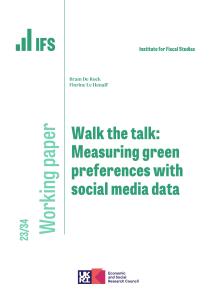Current UK energy use policies, which primarily aim to reduce carbon emissions, provide abatement incentives that vary by user and fuel, creating inefficiency. Distributional concerns are often given as a justification for the lower carbon price faced by households, but there is little rationale for carbon prices associated with the use of gas to be lower than those for electricity. We consider reforms that raise carbon prices faced by households and reduce the variation in carbon prices across gas and electricity use, improving the efficiency of emissions reduction. We show that the revenue raised from these reforms can be recycled in a way that ameliorates some of the distributional concerns. Whilst such recycling is not able to protect all poorer households, existing policy also makes distributional trade-offs, but does so in an opaque and inefficient way.
Authors

Research Fellow University of Warwick
Arun is a Research Fellow at IFS, an Associate Professor of Economics at the University of Warwick and a Commissioner at the Wealth Tax Commission.

Associate Director
I completed a PhD at UCL in 2020. My work examines the drivers of variation in the quantity and quality of healthcare provided to different patients.
Journal article details
- DOI
- 10.1111/1475-5890.12097
- Publisher
- Wiley
- Issue
- Volume 38, Issue 2, June 2017
Suggested citation
Advani, A and Stoye, G. (2017). 'Cheaper, greener and more efficient: rationalising UK carbon prices' 38(2/2017)
More from IFS
Understand this issue

Spring Budget 2024: What you need to know
7 March 2024

Spring Budget 2024: the Chancellor’s options

The £600 billion problem awaiting the next government
25 April 2024
Policy analysis

Spring Budget 2024
6 March 2024

Reforming the taxation of non-doms: policy options and uncertainties
4 March 2024

Oil and gas make Scotland’s underlying public finances particularly volatile and uncertain
27 March 2024
Academic research

Intertemporal income shifting and the taxation of business owner-managers
24 January 2024

Insurance, redistribution, and the inequality of lifetime income
2 November 2023

Walk the talk: Measuring green preferences with social media data
6 November 2023